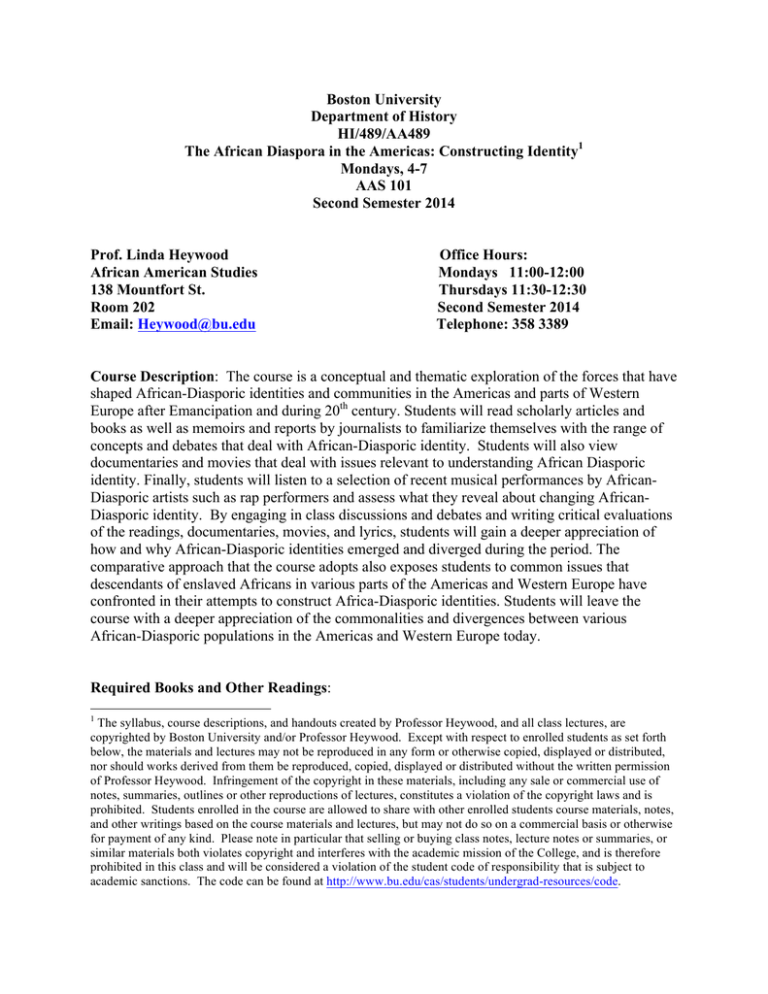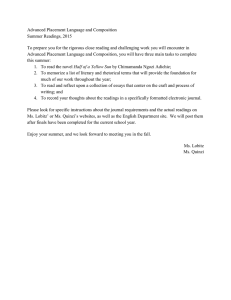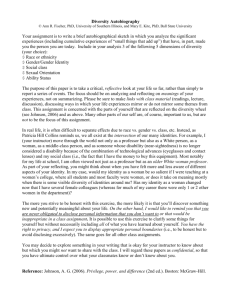Syllabus-HI 489 Diaspora-Identity 2014
advertisement

Boston University Department of History HI/489/AA489 The African Diaspora in the Americas: Constructing Identity1 Mondays, 4-7 AAS 101 Second Semester 2014 Prof. Linda Heywood African American Studies 138 Mountfort St. Room 202 Email: Heywood@bu.edu Office Hours: Mondays 11:00-12:00 Thursdays 11:30-12:30 Second Semester 2014 Telephone: 358 3389 Course Description: The course is a conceptual and thematic exploration of the forces that have shaped African-Diasporic identities and communities in the Americas and parts of Western Europe after Emancipation and during 20th century. Students will read scholarly articles and books as well as memoirs and reports by journalists to familiarize themselves with the range of concepts and debates that deal with African-Diasporic identity. Students will also view documentaries and movies that deal with issues relevant to understanding African Diasporic identity. Finally, students will listen to a selection of recent musical performances by AfricanDiasporic artists such as rap performers and assess what they reveal about changing AfricanDiasporic identity. By engaging in class discussions and debates and writing critical evaluations of the readings, documentaries, movies, and lyrics, students will gain a deeper appreciation of how and why African-Diasporic identities emerged and diverged during the period. The comparative approach that the course adopts also exposes students to common issues that descendants of enslaved Africans in various parts of the Americas and Western Europe have confronted in their attempts to construct Africa-Diasporic identities. Students will leave the course with a deeper appreciation of the commonalities and divergences between various African-Diasporic populations in the Americas and Western Europe today. Required Books and Other Readings: 1 The syllabus, course descriptions, and handouts created by Professor Heywood, and all class lectures, are copyrighted by Boston University and/or Professor Heywood. Except with respect to enrolled students as set forth below, the materials and lectures may not be reproduced in any form or otherwise copied, displayed or distributed, nor should works derived from them be reproduced, copied, displayed or distributed without the written permission of Professor Heywood. Infringement of the copyright in these materials, including any sale or commercial use of notes, summaries, outlines or other reproductions of lectures, constitutes a violation of the copyright laws and is prohibited. Students enrolled in the course are allowed to share with other enrolled students course materials, notes, and other writings based on the course materials and lectures, but may not do so on a commercial basis or otherwise for payment of any kind. Please note in particular that selling or buying class notes, lecture notes or summaries, or similar materials both violates copyright and interferes with the academic mission of the College, and is therefore prohibited in this class and will be considered a violation of the student code of responsibility that is subject to academic sanctions. The code can be found at http://www.bu.edu/cas/students/undergrad-resources/code. W.E.B. DuBois, The Souls of Black Folk (New York, Norton, 1999). Frantz Fanon, Black Skin: White Masks (Grove Press, revised ed. 2008). Claude McKay, Banjo Gary Younge, No Place Like Home: A Black Briton’s Journey Through the American South (University Press, 2002). Maria de Los Reves Castillo Bueno et al, Reyita: The Life of a Black Cuban Woman in the Twentieth Century (Duke, 2000). Essie Mae Washington Williams, Dear Senator: A Memoir (Harper, 2006). Additional Readings are available on Blackboard Learn (BL) Required books can be purchased at the bookstore. One copy of each required book is also be available at Mugar Reserve. To obtain a list of the materials on reserve go to http://library.bu.edu and click on Reserve Services, selecting either my name or the course number. The additional required readings are available at Blackboard Learn (http://www.bu.edu/tech/teaching/lms/blackboard/). BL Attendance: Prompt and regular attendance is required. No late assignments will be considered without supportive evidence of illness or personal hardship, otherwise a grade of “zero” will be given for each graded assignment missed. Course Requirements Grading: Essays on 3 of the Weekly Readings Oral Presentation Class Participation/Attendance Research Paper 30% 10% 20% 30% Essays: Three essays (4 pages-not including footnotes-Font size Times New Roman 12). The essays should be based on the readings from three different weeks. The essays will be graded for critical evaluation of the main themes covered as well as for organization and coherence. Essays must be submitted at the end of Week 4, Week 7, and Week 10 class meetings. Each essay counts for 10% of the course grade for a total of 30%. Oral Presentation and Class Participation: Each student will be required to make one formal presentations of 30 minutes each. The presentation should be on one of the week’s readings. The presentation should not be done on the readings that you have selected for your critical essays. Students must select the date for their oral presentation during the first class session. The oral presentation is worth 10 % of the final grade. All students are expected to attend each class and to be active participants in all class discussions. Oral presentation is worth 10% of the final grade and class participation/attendance will account for 10% for a total of 20% of course grade. Final Paper: Final paper can be on any of the themes arising from the weekly readings and discussions. Each student must consult with the instructor before deciding on a topic and undertaking research for the paper. Students should submit a one page description of their topic (proposal) on Monday March 3 during class. These will be returned with comments the following Monday. Supporting material for final paper should be selected from the core weekly readings as well as from outside readings. Final papers from students who have not handed in a proposal will not be accepted. Research papers account for 30% of the final grade. The final paper should be between 3,000-3,500 words –Font Size-Times New Roman 12. Academic Integrity Policy: Each student is expected to author his/her own work. Students should familiarize themselves with CAS Academic Conduct Code. Students who submit plagiarized papers or other assignments that they have not authored will be subject to the penalties imposed by the CAS Academic Conduct Code. For more on CAS Academic Conduct Code link to: www.bu.edu/cas/academics/programs/conductcode.html. Weekly Class Meetings Part One: In Search of Definitions and Concepts of African Diaspora Identities in the Atlantic World Week 1 1/27: Defining Diaspora Readings: Colin Palmer, Defining and Studying the Modern African Diaspora’” Perspectives, 1998. BL Kristian Mann, “Shifting Paradigms in the Study of the African Diaspora and the study of the African Diaspora, Slavery and Abolition, 22, 1, pp. 321. BL Kim Butler, “Defining Diaspora: Redefining a Discourse.” BL Lecture, Discussion Week 2 2/3: Towards a Theory of Identity and the African Diaspora: Methods and Approaches Readings: Stewart Hall, “Cultural Identity.” BL James Clifford, "Diasporas", Cultural Anthropology, vol. 9, no. 2, 1994, pp. 302-338.BL William Safran, “Diasporas in Modern Societies…” BL Lecture, Presentation, Discussion Part Two: Historicizing African-Diasporic Identities: 1830s-1930’s Week 3 2/10 North America, 1830s-1930’s Readings: DuBois, The Souls of Black Folk (Begin to Chapter V11) Roberta S. Gold, “The Black Jews of Harlem.”BL Lecture, Presentation, Discussion . Week 4 2/19 (Wednesday) Brazil and Cuba/Latin America, 1830s-1930 Reading: Kim Butler, “Africa in the Re-invention of nineteenth Century Afro-Brazilian Identity,”Slavery and Abolition, 22, 1, 2001, pp. 135-54. Helg,“Race and Black Mobilization”. BL Giovennetti, “Identity…Race, Religion and Empire…Cuba.”BL Lecture, Presentation, Discussion Week 5 2/24 French and English-Speaking Caribbean, 1830s-1930s Reading: Claude McKay, Banjo (begin) E.J. Hawthorne, “Self-Writing…Mary Seacole…Jamaica.” BL Michael Largey, “Haitian Cultural Identity.” BL Torres-Saillant,“The Tribulations of Blackness.” BL Lecture, Presentation, Discussion Part Three: Identity, Race, Politics and Culture Week 6 3/3 Competing Ideologies and Conflicting Loyalties: Race and New Identities in the Making 1 Reading: Frantz Fanon, Black Skin/White Mask (Begin) Claude McKay, Banjo (continue to end) DuBois, Souls of Black Folk (continue to end) Lecture, Presentation, Discussion Week 7 3/17: Competing Ideologies and Conflicting Loyalties: Race and New Identities in the Making 11 Frantz Fanon, Black Skin/White Mask; (continue to end) Murdock,”Creolizing the Metropole.” BL Video, West Indians in Britain and the War Efforthttp://www.youtube.com/watch?v=ViGwxJloI70&feature=player_embedded#! Lecture, Presentation, Discussion Week 8 3/24: Competing Ideologies and Conflicting Loyalties: Race and New Identities in the Making 111 Reading: Mangual, Lydia Cabrera and the Construction of an Afro-Cuban Identity (pp. 27-57) BL Michael Agier, “Racism, Culture and Black Identity in Brazil” BL Aparicio, “The Blackness of Sugar.” BL María de los Reyes Castillo Bueno, Reyito (Begin to chapter 2). Lecture, Presentation, Discussion Part Four: The Individual and the Making of African-Diasporic Identity Week 9 3/31: Biography 1 Reading: Washington-Williams, Dear Senator (Begin to middle) Claude McKay, Banjo (Continue to end) Lecture, Presentation, Discussion Week 10 4/7 Biography, 11 Reading: María de los Reyes Castillo Bueno, Reyito (Continue to End) Snaith, “Una Marson: Little Brown Girl.” BL Benedita da Silva, An Afro-Brazilian Woman’s Story (excerpts) BL Lecture, Presentation, Discussion Week 11 4/14 African Diasporic Identity: Biography 111 Reading: Washington-Williams, Dear Senator (Continue to End) Younge, No Place Like Home: A Black Briton’s Journey Jean Mutebo Rahier, “Métis/Mulâtre, Mulato, Mulatto, Negro…Black… Identities.” BL Lecture, Presentation, Discussion Part Five: Creating (Re-creating) African Diasporic Identities: The Media Week 12 4/24 (Thursday): Reading: Ed Guerrero, “The Black Man on Our Screens.” BL Telles, “Racial Ambiguity…Brazilian Population.” BL Ben Carrington, “Improbable Grounds: Black Intellectuals. ”BL Viewing of one of the following videos: Bamboozled; Franz Fanon; Black Orpheus; The Harder They Come Lecture, Presentation, Discussion of Readings and Videos Week 13 4/28: Afro-Diasporic Identities: Music and Art Reading: George Lipsitz, “Diasporic Noise, History, Hip Hop…Politics of Sound.” Fuentes, “Afro-Cuban Movement.” BL Philip Galinsky, “Co-option, Cultural Resistance and Afro-Brazilian Identity.” BL http://www.youtube.com/watch?v=hLB5bUNAesc (Ladies First) http://www.youtube.com/watch?v=93fxMbKlHdw; http://www.youtube.com/watch?v=mnIHpFxyNR4 Discussion of Readings, Video clips and Films;



